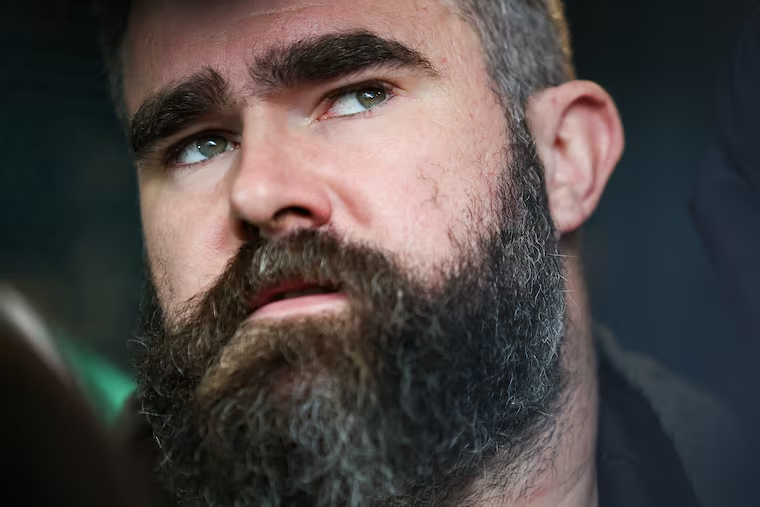When Jason Kelce walks away from the Eagles, he’ll be ready to live a new life. Too many of his peers can’t say the same.
Kelce will be one of the fortunate ones. He has paved his way for an easy transition to his post-football life. Most NFL players don't.

When the Eagles drafted him on Saturday, April 30, 2011, Jason Kelce was 23. He was not married. He was not a father. He was not a podcaster. He was not a surefire Hall of Famer. He had not won a Super Bowl. He had not donned a purple Mummers costume at a Super Bowl parade. He had not been the subject of an Amazon documentary or graced the cover of People Magazine. He had not become The Other Kelce Brother.
Each cell in the human body survives, on average, seven to 10 years. So in every possible way, Kelce is a different person now, as he weighs the right time to announce his retirement from professional football, from the one he was when he arrived in Philadelphia.
Two things, though, did not change for Kelce over his 13 years here: the amount of time he spent preparing to play football and his understanding that he needed to spend his free time on something other than preparing to play football. The second of those factors is the more important and, in the discussion around Kelce’s future, is too often overlooked.
Everyone takes for granted that, whenever he gets around to making his retirement official, Kelce will thrive in his post-Eagles life. He can continue recording his podcast. He might work in talk-radio or television, become an NFL analyst or talking head, having dabbled in those endeavors already. He might choose to do something that has nothing to do with football. He grew up in suburban Cleveland, in “a community that was very liberal-artsy,” he said Wednesday. He’s smart enough, relatable enough, charismatic enough to do just about whatever he wants.
» READ MORE: Jason Kelce told me that Wednesdays were wearing on him. There’s more to his impending retirement than that.
He is the exception among NFL players in that regard. It’s worth remembering that.
“This is one of the reasons guys do struggle, potentially, with retirement,” Kelce said in the Eagles’ locker room during the players’ clean-out day. “You get into a routine and a rhythm and a process, right? You come in every day in the season on certain days and do your routine. You go about your business. You watch the film. You assess. Wednesdays are first and second downs. Thursdays were on third downs. Fridays, we’re on red zone.
“When you get into that rhythm, it’s very easy with the other time you have to allocate it to the family, to the podcast. You can pick up these other things, and I actually think it’s really important. Too many players don’t have hobbies and don’t have things outside of the game. That, in some ways, can be equally detrimental to a player on the field and off.”
He was making a pretty profound point there, and a familiar one. It can be difficult enough for anyone, in any profession, to step away and begin anew. But the pull of football is so strong, so much punishment and sacrifice and discipline squeezed into such a short period of time, that the whole exercise is — in some sense, maybe in every sense — an addiction.
» READ MORE: In a culture of faux ‘authenticity,’ Eagles’ Jason Kelce shows what the real thing looks like
For every Kelce, for every Ike Reese, for every NFL player who can wean himself off that drug and find happiness and stability in his family, in his second career, in a hobby or vocation, there are dozens, probably hundreds, who never do. They have creaky knees crisscrossed with surgery scars. They have stabbing pain, still, in their hips. They can’t sit for too long. They have depression and cannot shake it. They have CTE and will never confirm it while they’re alive. They will show up to halftime ceremonies and stand at midfield and wave to the crowds and remember the relationships and camaraderie with their teammates and then return to their too-quiet homes again.
What do they do when the routine is gone and the cheering stops and the search for meaning in another endeavor has to start?
“There are a lot of former players who are suffering, some who used to play here that I know of,” Eagles tackle Lane Johnson said back in 2022. “I’m not going to give any names, but they’re in pretty damn bad shape. I don’t know, man. They’ve been playing football their whole life, and now they get out and they’re suffering. They have bad anxiety or depression. It affects their wives. It affects their children.”
Once the news of Kelce’s retirement flashes across smart phones and creeps across the bottom of television screens, there will be a predictable reaction. There will be questions about how the Eagles will replace him, about whether they can, about whether another athlete ever connected better with this city and its sports fans. What there ought to be, first and foremost, is a celebration, an appreciation and acknowledgment that Jason Kelce will walk away on his own terms and into a life that he is ready and eager to live. Only so many men like him can say the same.
» READ MORE: Former Eagles punter Max Runager died with CTE. His son wants the NFL and everyone else to notice.